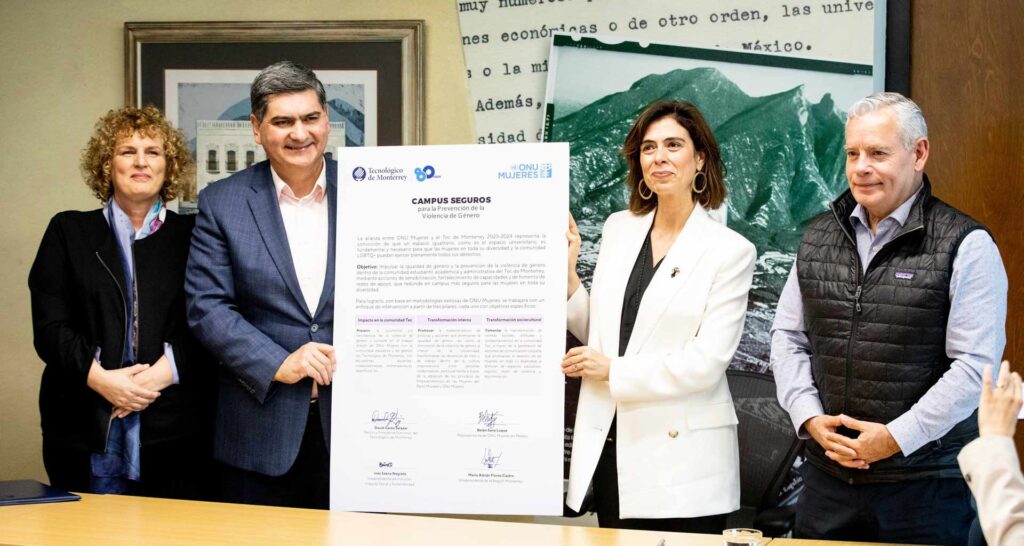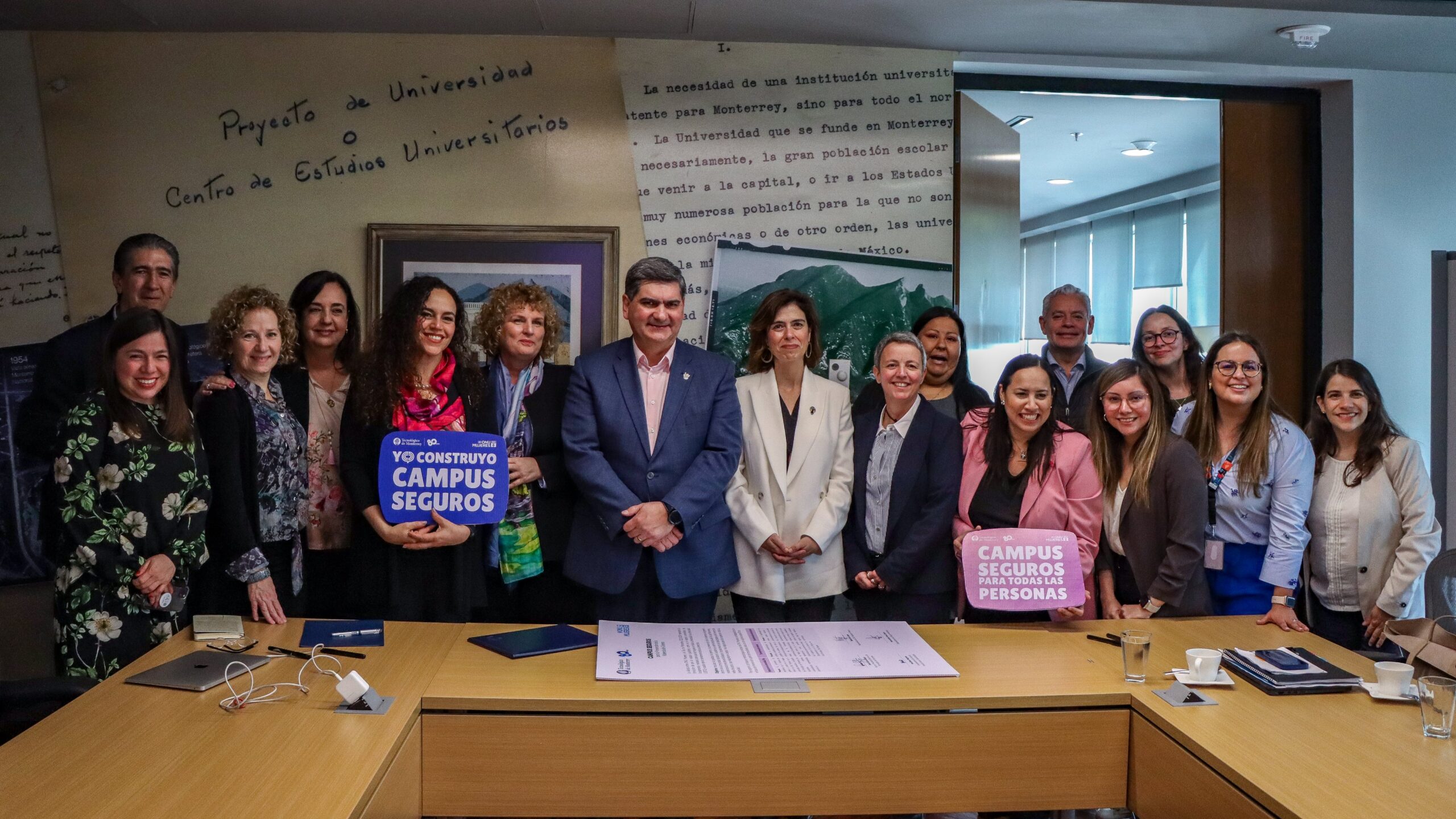To promote gender equality and prevent gender violence in its community, Tecnológico de Monterrey signed an alliance with UN Women to be part of the “Safe Campus for the Prevention of Gender-based Violence” program. With this agreement, Tec de Monterrey became the first educational institution to be part of the Safe Campus Program through this collaboration with the international organization.
“We reaffirm our commitment to reducing the gender gap in our institution as a priority,” said David Garza, Rector and Executive President of Tec. “The agreement with UN Women implies redoubling efforts to move towards cultural transformation and sharing knowledge and lessons learned,” Garza added during the meeting.
Also attending the signing of the agreement were Belén Sanz, representative of UN Women in Mexico; Inés Sáenz, Vice-President of Inclusion, Social Impact, and Sustainability at Tec de Monterrey; and Mario Adrián Flores, Vice-President of the Monterrey Region of Tec de Monterrey.
Tec de Monterrey: the first university with a Safe Campus Program
Tec de Monterrey is the first university to implement the Safe Campus Program with the accompaniment of UN Women, said Inés Sáenz. “This partnership with UN Women is very significant. This agreement helps us promote and continue building gender equality from the fundamental pillar of eradicating gender violence,” she continued.

For her part, Belén Sanz explained that the implementation of Safe Campuses is based on an adaptation of one of UN Women’s global programs called Safe Cities. “The methodology we offer today to Tec has already been tested in different cities with positive results; this will be the first time it will be applied to a university. We have promoted adapting the Safe Cities Program for women and girls that has been implemented in urban spaces. In Tec’s case, it is innovative in including a comprehensive interventional model with three axes,” said Sanz, who added that Tec is part of this opportunity due to the history of collaboration between the two institutions since 2019, when they signed the collaboration agreement #HeForShe. “We identified that Tec is a scenario of enormous opportunity to demonstrate that safe campuses can be built for women and girls; a safe campus benefits the entire community and can generate a replicating effect on other campuses.”
The program will be implemented first on the Monterrey campus, which has a population of about 20,000 students. Eventually, it is expected that the program can be replicated in all the institutions comprising Tecnológico de Monterrey in Mexico.
The Three Pillars of a Safe Campus
The “Safe Campus for the Prevention of Gender-Based Violence” program, developed by UN Women, consists of a methodology that has an interventional approach based on three pillars:
1. Impact on the Tec community
Consists of preventing gender violence by involving students, teachers, collaborators, coaches, and others in activations, awareness workshops, and actions aimed at good prevention practices.
2. Internal transformation
Aims to implement policies and actions for gender equality, promote representation and development pathways for women, and eliminate gender violence within the Institution.
3. Social transformation
Promotes the transformation of social norms, attitudes, and behaviors in the Tec community, with united communication actions favoring the rights of women in all their diversity to have safe, educational spaces free of violence and discrimination.
“At UN Women, we promote this type of collaboration because we are convinced that universities are catalytic centers that generate social constructions and impact the mentality of young people who graduate from their educational community,” said Belén Sanz. “This idea of Safe Campuses has a systemic approach. We cannot only think of a safe campus, which is a fraction of our reality. We have to think about society as a whole and how to promote safety and equality from an institution like Tec de Monterrey,” said the Vice-president.
Higher Ed’s Impact on society
According to UN Women studies, universities are one of the public spaces most at risk of violence against women, but it is also where societies can be put on track toward gender equality and security for all. “Universities are centers of enormous influences on society as a whole. From the universities come the youth who will make profound decisions in the future. At UN Women, we bet on university spaces because they are gateways for transformation. We need young people to be agents of change. We need a university like Tec that invests its efforts and creativity toward this transformation directed from the highest levels of management. It will surely have a replicating effect on Mexican society and the world,” said Sanz.
The Vice-President of Inclusion, Social Impact, and Sustainability at Tec agreed that a joint effort like this could generate a change of culture in society. “Starting from the fact that Tec is an institution of society for society, we want to be that catalyst and change agent for society. We are firmly convinced that, working hand in hand with institutions like UN Women, we will achieve cultural changes and impact society significantly,” added Inés Sáenz. She also commented that all the actions to be implemented within the framework of Safe Campus and their progress will be documented so that other higher education institutions can know about the program.
Learn about Tec’s actions for gender equality
In 2019, Tec de Monterrey signed an alliance with UN Women to join the global movement called #HeForShe, assuming nine commitments to promote gender equality and combat and eradicate violence against women. “That agreement with UN Women signed in 2019 transformed us; over the years, it has helped us to promote measures that lead us towards gender equality and the elimination of gender violence,” said Inés Sáenz.
Then, in 2021, the institution presented the Gender Equality Plan 2021-2025, which promotes creating and implementing policies and actions to generate equal opportunities for all people in the Tec community. The Vice President of Inclusion, Social Impact, and Sustainability at Tec stressed that the institution has promoted efforts to generate an environment where everyone feels safe, included, and valued. Examples include the redesign of open and inclusive spaces and the homologation of employee benefits. Others are strengthening the Center for the Recognition of Human Dignity, the Office of Gender and Safe Community with 22 points of attention on different campuses, and an Action Protocol for Attention and Prevention of Gender Violence.
For his part, David Garza stressed that Tec has voluntarily joined initiatives such as the National Observatory for Gender Equality in Higher Education Institutions. “External reviewers evaluated what we are doing at Tec and issued an assessment that places us as one of the best-evaluated private universities nationwide, but the important thing is what we learn and the feedback these processes give us,” Garza said. In addition, Tec de Monterrey is part of the University Network of Gender, Equity, and Sexual Diversity in the Union of Universities of Latin America and the Caribbean (UDUAL).
Translation by Daniel Wetta
This article from Observatory of the Institute for the Future of Education may be shared under the terms of the license CC BY-NC-SA 4.0 
)
)

)